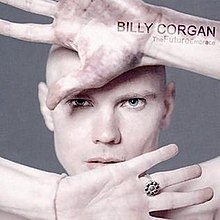Walking Shade
| TheFutureEmbrace | ||||
|---|---|---|---|---|
 |
||||
| Studio album by Billy Corgan | ||||
| Released | June 21, 2005 | |||
| Recorded | October 2004 – March 2005 | |||
| Genre | ||||
| Length | 45:21 | |||
| Language | English | |||
| Label | Reprise | |||
| Producer |
|
|||
| Billy Corgan chronology | ||||
|
||||
| Professional ratings | |
|---|---|
| Aggregate scores | |
| Source | Rating |
| Metacritic | 59/100 |
| Review scores | |
| Source | Rating |
| AllMusic | |
| Alternative Press | |
| Blender | |
| Robert Christgau | |
| The Guardian | |
| NME | 7/10 |
| Pitchfork | 6.4/10 |
| PopMatters | |
| Rolling Stone | |
| Uncut | |
TheFutureEmbrace is the debut solo album by American musician Billy Corgan, frontman of the alternative rock band The Smashing Pumpkins. Released in June 2005, the album's sound was markedly different from most of Corgan's earlier work, eschewing his characteristic "drums, bass, (and) big-guitars sound" in favor of an electronic sound punctuated with heavily distorted guitar parts reminiscent of shoegazing.
After the dissolution of Zwan in late 2003, Corgan set to work on a solo album of songs based on the history of his hometown, Chicago. This project was shelved and Corgan began work on TheFutureEmbrace in late 2004 in his Chicago studio, Pumpkinland. Rather than repeat the sonic territory of his earlier bands, Corgan decided on an electronic sound with shoegaze influences. Regarding the atypical sound of the album, Corgan remarked,
The sound of the album is almost entirely synthesized, with the exception of Corgan's voice and guitar playing. Corgan has an extensive collection of vintage analog synthesizers and drum machines that were employed on the album. The synths were largely programmed by Bon Harris of Nitzer Ebb.
Arrangements on the album followed an unusual process: for each song, Corgan would write the basic structure, and the song's melody was then split into four sections based on the bass, tenor, alto, and soprano voicings of the chord structure. The production team – Corgan, Harris, producer Bjorn Thorsrud, and programmers Matt Walker and Brian Liesegang – would then program different synth melodies in each voicing, and combine them into a multitrack recording. Drums were added, mostly from pre-1985 drum machines. At this point, Corgan would rework vocal parts and record vocals, as well as recording his guitar part. Each song contains a single take of guitar, in stark contrast to the Boston-style multitracking employed on Smashing Pumpkins albums. Despite the challenge of this approach, it was employed for all album tracks as well as an additional 8 outtakes.
...
Wikipedia
